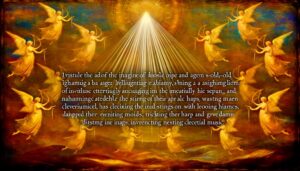1113 Meaning In The Bible: Divine Encouragement
The number 1113 is not explicitly mentioned in canonical Bible texts; however, scholars interpret its theological significance through numerological analysis and contextual readings. The number combines elements of 1 (unity), 3 (divine completeness), 11 (disorder), and 13 (transformation), suggesting themes of spiritual awakening and divine guidance.
It reflects the coexistence of unity and completeness alongside disorder and transformation, pointing towards a journey of faith and moral alignment with divine will. The intricate interplay of these elements hints at deeper spiritual and theological insights that can be uncovered through further scholarly exploration. Many have sought meaning in the Bible, finding guidance and inspiration that resonates with their personal experiences. This quest for understanding often bridges the gap between ancient texts and contemporary life, encouraging individuals to reflect on their own beliefs and values. As such, the journey becomes not only a pursuit of knowledge but also a transformative process that nurtures one’s spiritual growth.

1113 Meaning in the Bible: Spiritual Significance and Biblical Insight
| Aspect | Details |
|---|---|
| Numerical Breakdown | 1 (unity, God), 11 (spiritual insight, transition), 3 (divine completeness) |
| Possible Scriptures | Mark 11:13 – Fig tree with no fruit, a lesson on spiritual fruitfulness |
| Symbolism | Spiritual awakening, discernment, and readiness |
| Angel Number Insight | Encouragement to trust divine timing and stay faithful |
| Message to Believers | Focus on spiritual growth, bearing fruit, and divine alignment |
Scriptural Occurrences of 1113
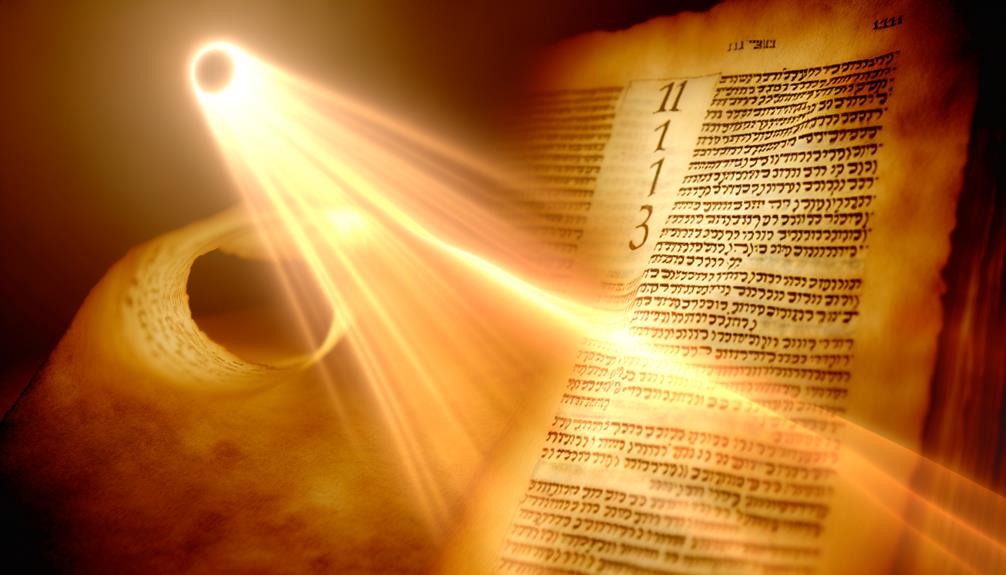
The number 1113 does not explicitly appear in the canonical texts of the Bible, prompting scholars to explore its significance through numerological analysis and contextual interpretations of related passages.
Scholars often dissect the components of the number, such as 1, 3, 11, and 13, each bearing specific biblical connotations.
For instance, the number 1 symbolizes unity and primacy, while 3 represents divine completeness.
The numbers 11 and 13 are more complex; 11 can signify disorder, and 13 can denote rebellion or transformation.
Historical Context of 1113
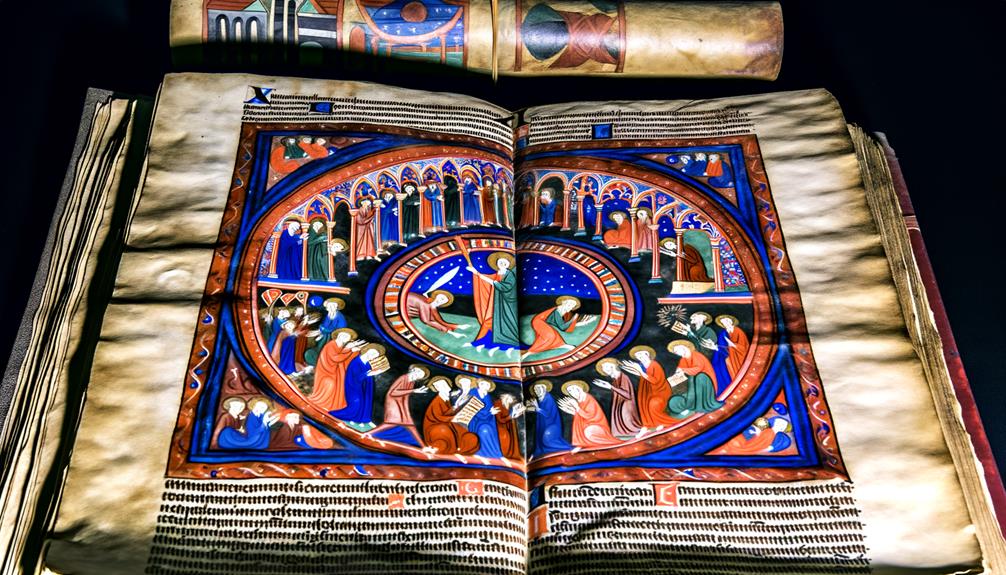
Building upon the numerological insights of 1113, an exploration into the historical context reveals how specific time periods and events might influence and shape its perceived significance. By examining these epochs, we can better understand the environment in which the number 1113 might have gained importance.
Consider the following historical markers:
- Medieval Europe: The year 1113 saw the Knights Hospitaller formally recognized by Pope Paschal II, impacting the sociopolitical landscape.
- Byzantine Empire: Alexios I Komnenos’ reign, marked by military and economic reforms, influenced the regional stability.
- Crusades: The ongoing Crusades dramatically shifted power dynamics between European and Middle Eastern territories.
- Religious Developments: The expansion of monastic orders during this period shaped theological discourse and ecclesiastical power.
These contexts provide a multifaceted view of 1113’s historical resonance.
Symbolism in Numerology

Numerology’s intricate symbolism often attributes specific meanings to numbers, with 1113 representing a confluence of spiritual awakening, divine guidance, and new beginnings.
Within the biblical context, numerology explores how numbers can convey deeper spiritual truths and divine intentions. The number 1 signifies unity and primacy, often associated with God’s singularity and omnipotence. Repeated thrice, as in 111, it emphasizes the divine presence and a call to higher spiritual consciousness.
The number 3 denotes completeness and perfection, often reflecting the Holy Trinity. Consequently, 1113 symbolizes a potent combination of divine unity and spiritual fulfillment.
This confluence hints at a transformative journey underpinned by divine support and a renewed path towards spiritual enlightenment. Such interpretations enrich our understanding of biblical numerology.
Spiritual Significance

Examining the spiritual significance of 1113 within the biblical framework reveals a profound interplay between divine intention and personal spiritual growth. This number often serves as a reminder of one’s connection to the divine, encouraging individuals to embrace their inner calling and align their actions with higher truths. Additionally, 1113 can be interpreted through the lens of 111, representing new beginnings and the awakening of spiritual awareness, while 3 signifies harmony and creativity. In this context, it stands august as a symbol of majesty, inviting seekers to acknowledge their spiritual sovereignty and the transformative power of faith in their lives.
This number often symbolizes the alignment of human actions with divine will, fostering an enriched spiritual journey.
Key aspects include:
- Divine Purpose: 1113 signifies the realization of God’s overarching plan, encouraging believers to trust in divine timing.
- Faith Strengthening: It underscores the importance of unwavering faith, especially during trials and tribulations.
- Spiritual Awakening: This number acts as a catalyst for deeper spiritual awareness and enlightenment.
- Moral Integrity: 1113 serves as a reminder to uphold moral and ethical standards as guided by biblical teachings.
Interpretations by Theologians
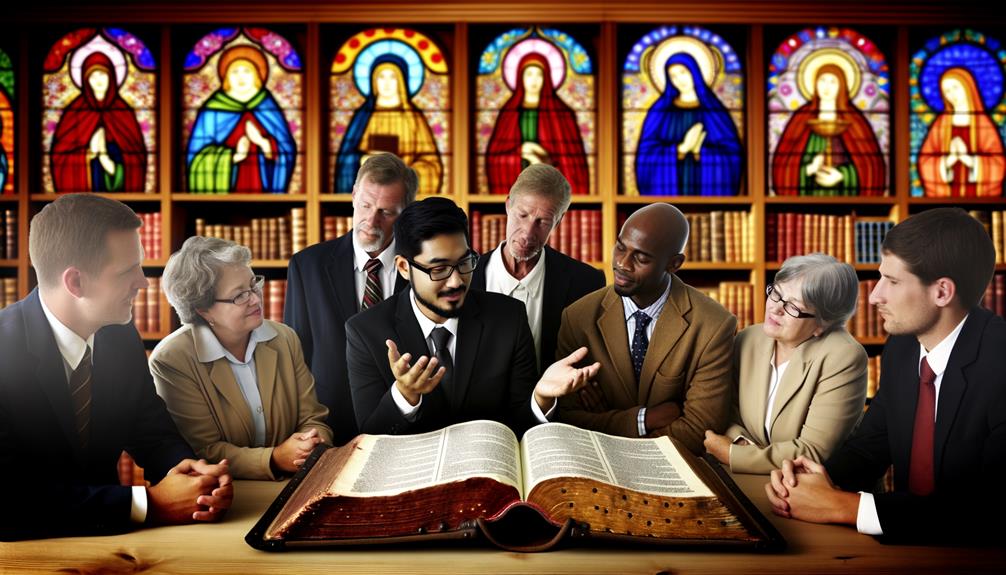
In various theological discourses, the number 1113 has been interpreted through a multifaceted lens, where its symbolic significance is deeply analyzed within the context of biblical narratives and doctrines.
Theologians often examine this number through the lens of numerology, typology, and scriptural exegesis, aiming to uncover underlying meanings and divine messages.
For instance, some scholars link 1113 to themes of divine completeness and trinity, noting its constituent digits (1 and 3) as bearing theological weight.
Others investigate its occurrence within specific biblical passages, exploring how historical and cultural contexts influence its interpretation.
Cross-Referencing Other Numbers

To fully understand the significance of the number 1113 in the Bible, it is essential to cross-reference it with other numbers found within the scriptural text.
By examining Biblical numerology insights and symbolic interpretations, scholars can uncover deeper meanings and interconnected themes.
This analytical approach involves applying rigorous scriptural cross-referencing techniques to reveal the broader theological context and implications.
Biblical Numerology Insights
Biblical numerology often involves cross-referencing numbers to uncover deeper spiritual meanings and connections throughout scripture. By examining the recurrence and context of specific numbers, scholars can gain insights into their symbolic significance.
For instance:
- Three (3): Symbolizes completeness and divine perfection, as seen in the Trinity.
- Seven (7): Often represents spiritual perfection or completion, especially in the seven days of Creation.
- Twelve (12): Indicative of governmental perfection, reflected in the twelve tribes of Israel and the twelve apostles.
- Forty (40): Denotes trials and testing, such as the Israelites’ 40 years in the wilderness.
These numbers transcend mere numerical value, embodying profound theological and moral principles that permeate biblical narratives and teachings, enabling a richer understanding of the scriptural text.
Symbolic Interpretations Explored
Examining additional numbers within the Bible reveals layers of symbolic meaning that contribute to a deeper understanding of theological concepts and historical contexts. These numbers often reflect divine principles and serve as reminders of important narratives. For instance, the number 716 biblical meaning explained delves into themes of responsibility and divine purpose within the scriptures. By exploring these numerical significances, readers can enrich their spiritual journey and gain insights into the mysteries of faith.
Numbers such as 7, 12, and 40 frequently recur, each imbued with specific significance.
The number 7, often associated with completeness or divine perfection, is exemplified in the seven days of creation (Genesis 1).
Similarly, the number 12 symbolizes governance or divine order, as seen in the twelve tribes of Israel and the twelve apostles of Jesus (Matthew 10:1-4).
The number 40, representing periods of trial or preparation, is evident in the 40 days of Jesus’ temptation (Matthew 4:2) and the Israelites’ 40-year wilderness journey (Numbers 14:33).
These symbolic interpretations enrich biblical exegesis.
Scriptural Cross-Referencing Techniques
In understanding the significance of numbers in the Bible, scriptural cross-referencing techniques are essential for uncovering deeper theological insights and contextual connections. The practice involves examining various passages to identify recurring numerical themes and their symbolic meanings.
Scholars utilize several strategies for effective cross-referencing:
- Identifying Numerical Patterns: Recognizing repeated numbers within different books and passages.
- Comparative Analysis: Evaluating how numbers are used in various contexts to reveal consistent themes.
- Historical Contextualization: Situating numbers within their historical and cultural backdrop for enriched understanding.
- Theological Implications: Analyzing the spiritual and doctrinal significance attributed to specific numbers across scriptures.
1113 in Biblical Prophecies

The number 3 holds significant symbolic weight in biblical prophecies, frequently representing concepts of completeness and divine perfection.
Analyzing these instances within their historical contexts reveals how this number is intricately woven into prophetic literature, from the three days of Christ’s resurrection to the triad of the Holy Trinity.
Additionally, interpretative variations across different theological traditions provide a rich tapestry of understanding, underscoring the multifaceted nature of biblical numerology.
Symbolism in Prophecies
Symbolism plays a critical role in Biblical prophecies, often encapsulating complex theological concepts within vivid imagery and numerical representations. This symbolic language serves to convey divine messages in a nuanced manner, requiring careful interpretation.
Key symbolic elements include:
- Numbers: Numbers like 3, 7, and 12 often signify completeness or divine perfection.
- Animals: Creatures such as lambs, lions, and serpents symbolize various attributes, such as innocence, strength, and deception.
- Colors: Colors like red, white, and black frequently denote bloodshed, purity, and judgment.
- Objects: Items such as scrolls, trumpets, and seals represent revelation, divine intervention, and authority.
These symbols, when interpreted within their scriptural context, illuminate deeper theological truths and prophetic meanings.
Historical Context Analysis
Understanding the historical context of the number 3 in Biblical prophecies is essential for a thorough interpretation of its theological significance. The recurrence of the number 3 is vital in various biblical narratives and prophecies, often symbolizing completeness and divine perfection.
Examining these contexts provides insight into how ancient cultures perceived numerical symbolism and its implications for theological constructs.
| Event | Significance |
|---|---|
| Jesus’ resurrection on the third day | Fulfillment of prophecy |
| Jonah in the whale for three days | Prefiguration of Christ’s resurrection |
| Three visitors to Abraham | Manifestation of divine promise |
| Peter’s denial three times | Human fallibility and redemption |
| Three gifts from the Magi | Recognition of Christ’s kingship |
This analysis underscores the number 3’s integral role in framing biblical prophecy within its historical milieu.
Interpretative Variations Explained
Building on the historical context, interpretative variations of the number 3 in biblical prophecies reveal divergent theological perspectives and nuanced understandings across different scholarly traditions. Scholars have identified multiple layers of meaning associated with this number, reflecting its complex role in biblical narratives.
Key interpretations include:
- Trinitarian Symbolism: Many Christian theologians see the number 3 as representing the Holy Trinity—Father, Son, and Holy Spirit.
- Resurrection Significance: The three days between Christ’s death and resurrection are often interpreted as a fulfillment of prophetic timing.
- Completion and Perfection: Some traditions view the number 3 as symbolizing completeness or divine perfection.
- Covenantal Promises: Other interpretations link it to the fulfillment of God’s promises, emphasizing prophetic assurances and divine covenants.
These perspectives illustrate the rich, multifaceted significance of the number 3.
Application in Modern Faith
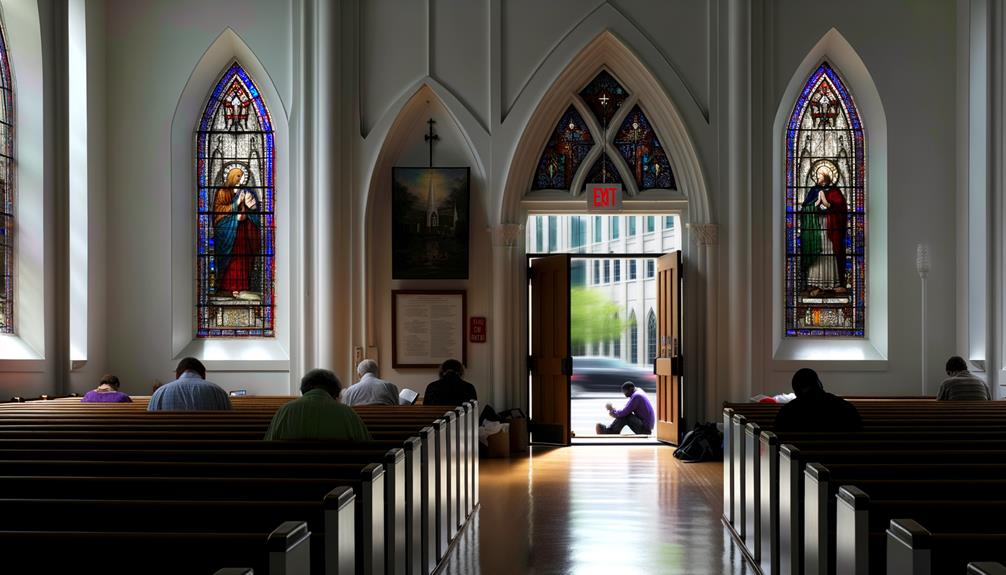
The interpretation of the number 1113 in the Bible offers profound insights that can be integrated into contemporary practices of faith, providing believers with a deeper spiritual connection and guidance. By exploring the biblical meanings behind numbers, one can uncover layers of wisdom that resonate in today’s spiritual journeys. The 244 biblical significance and interpretation further expands on this understanding, highlighting themes of divine purpose and connection. Embracing these symbolic insights can inspire believers to align their daily lives with deeper spiritual truths. Additionally, exploring numerical patterns can help believers reflect on their own spiritual journeys. For instance, the biblical significance of 225 reveals themes of completeness and divine order, encouraging individuals to seek harmony in their lives. By engaging with these interpretations, faith practices can become richer and more meaningful.
Numerological studies suggest that 1113 symbolizes divine order and spiritual awakening. In modern faith, this can be translated into a call for personal introspection and alignment with divine principles. Believers might use this symbolism to focus on harmonizing their lives with biblical teachings, fostering a sense of purpose and discipline.
Additionally, recognizing the spiritual significance of 1113 can encourage communal practices that emphasize unity and collective worship, thereby reinforcing shared values and mutual support within faith communities. This integration fosters a holistic approach to spiritual growth and communal harmony.
Conclusion
The exploration of the number 1113 in the Bible reveals its multifaceted significance, ranging from its scriptural occurrences to its symbolic and numerological implications.
One interesting statistic is that numerological interpretations often link 1113 to concepts of divine order and spiritual awakening, reflecting its profound influence on theological discourse.
By cross-referencing other biblical numbers and examining historical contexts, the number 1113 emerges as an essential element in understanding biblical prophecies and their application in modern faith practices.






